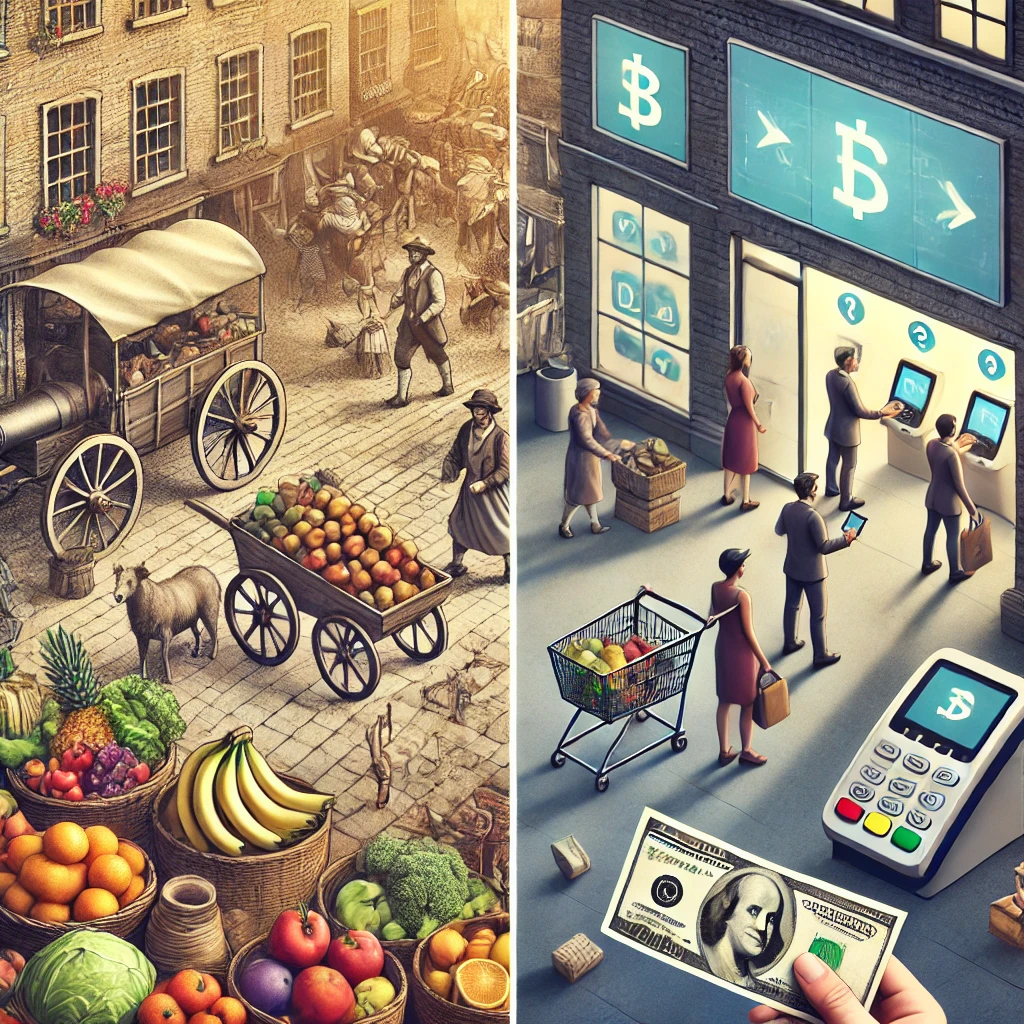Exploring the Differences Between Money and Barter

Have you ever wondered how people traded before money existed? Picture this: You've got a bunch of apples, but what you really need is a new pair of shoes. In a world without cash, you'd have to find someone with extra shoes who conveniently carved apples. Welcome to the barter system! It might sound simple, but boy, can it get complicated. Today, we're diving into the fascinating world of barter and how it differs from our familiar friend, money. Buckle up as we explore the pros, cons, and quirks of these two economic systems. Trust me, you'll never look at your wallet the same way again!
Defining the Barter System: How It Works
The barter system is a fascinating way to distinguish between money and barter systems in economic exchanges. At its core, barter exchange involves trading goods or services directly without using currency as an intermediary. You might wonder, "How does this actually work in practice?"
Direct Trade of Goods and Services
In a barter system, you'd exchange what you have for what you need. For example, if you're a farmer with extra eggs, you might trade them with a neighbour who has surplus milk. This direct swap forms the foundation of barter exchange.
Value Determination
One tricky aspect of the barter system is determining fair value. Without a standardized currency, you and your trading partner must agree on the worth of the items being exchanged. This can lead to interesting negotiations and creative solutions.
Community-Based Networks
Barter systems often thrive in close-knit communities where trust and reputation play crucial roles. You might find local barter networks or online platforms facilitating these exchanges, expanding the possibilities beyond your immediate circle.
By understanding how the barter system operates, you can better appreciate the unique advantages and challenges it presents compared to monetary transactions.
The Limitations of Barter and the Rise of Money
Imagine trying to trade your homemade pie for a new pair of shoes. Sounds tricky, right? That's the challenge of the barter system. While bartering has its charm, it comes with some serious drawbacks that led to the development of money as we know it today.
The Double Coincidence of Wants
One of the biggest hurdles in a barter exchange is finding someone who not only has what you want but also wants what you have. This "double coincidence of wants" can make transactions time-consuming and inefficient.
Lack of a Common Measure of Value
How many apples equal one cow? In a barter system, it's hard to compare the value of different goods. Money solves this by providing a standard unit of measurement for all items.
Inability to Store Value
Perishable goods lose value quickly in a barter system. Money, on the other hand, allows you to store wealth for future use. This fundamental difference between money and barter system paved the way for more complex economic structures and long-term planning.
Key Differences Between Money and Barter Exchange
When we distinguish between money and barter systems, several key factors come into play. Let's explore the main differences that set these two economic methods apart.
Flexibility and Convenience
Money offers unparalleled flexibility compared to the barter system. With cash or digital currency, you can easily purchase goods or services without the need for a direct exchange. In contrast, barter exchange requires finding someone who not only has what you want but also wants what you have to offer.
Value Measurement
In a monetary system, prices provide a precise measure of value. You can quickly compare the cost of different items. The barter system, however, lacks this standardized unit of measurement, making it challenging to determine fair trade values.
Storage of Wealth
Money serves as an excellent store of value over time. You can save it for future use without worrying about perishability. Barter goods, on the other hand, may deteriorate or become obsolete, limiting their long-term value.
By understanding these distinctions, you can appreciate why modern economies primarily rely on money while barter remains limited to specific situations or communities.
Conclusion
So there you have it - the key differences between cold hard cash and swapping your stuff. While bartering might seem old-school, it's still alive and kicking in some corners of the world. Money definitely makes things easier, but there's something kinda cool about trading directly for what you need. Next time you're cleaning out your closet, maybe consider setting up a neighbourhood swap meet instead of hitting the ATM. Who knows, you might score some sweet deals and meet your neighbours in the process. At the end of the day, whether you're counting bills or trading goats, commerce keeps on rolling. Happy trading, folks!
- Art
- Causes
- Crafts
- Dance
- Drinks
- Film
- Fitness
- Food
- Games
- Gardening
- Health
- Home
- Literature
- Music
- Networking
- Other
- Party
- Religion
- Shopping
- Sports
- Theater
- Wellness


